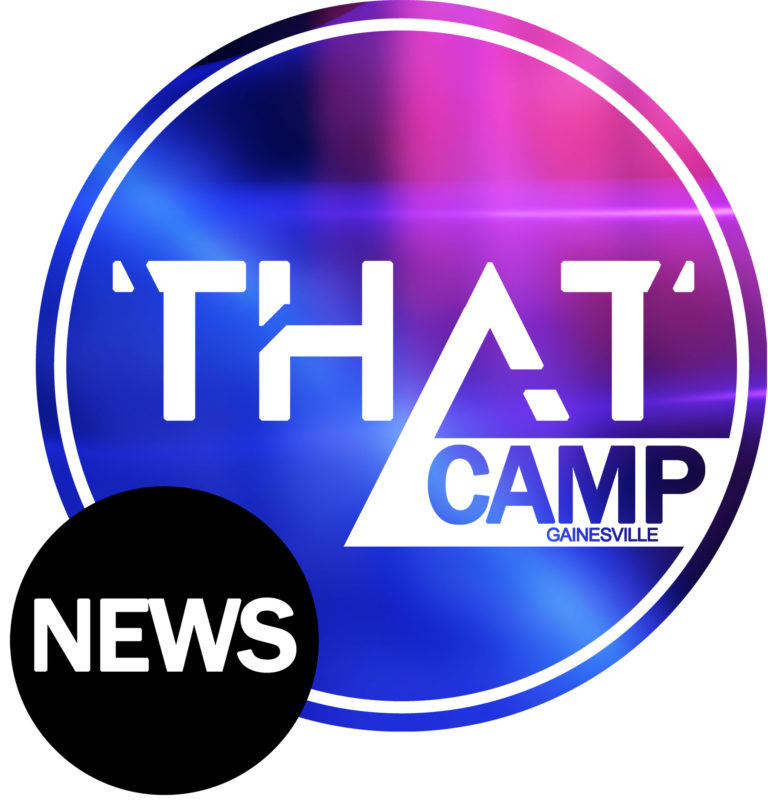I had a great time at ThatCamp Philly. This was my first ThatCamp ever, and I learned so much. Everyone was really nice and helpful. The amenities were pretty nice, too. In the morning, “Angels” helped us set up the software for the workshops we were attending. The organizers provided tea, coffee, sodas, water, and snacks all day long (people do need their caffeine). And for lunch, participants could sign up to go to a specific restaurant with 5-6 people. It was a great way for attendees to get to meet and talk to new people outside of the camp. Other conference organizers should take note!
As I already said on Twitter: thank you so much for such a great weekend.
Day 1
Friday was devoted to workshops. The three morning sessions included: 1. Mapping Your World: Exploring Free Web-Based Tools to Map and Visualize Your Data and Tell Your Story to the World (Scott Rutzmoser, Lehigh University), 2. WordPress Essentials (Michael Tedeschi, Interactive Mechanics), 3. Video Editing on the Cheap (Nicole Scalessa, Library Company). I attended the one on mapping, since my digital humanities project involves mapping the social networks and relationships of French decadent writers and their publishers (this will be for another blog post). For the moment, my map is hosted on cartoDB, but thanks to this workshop I discovered ArcGIS, which seems like a better fit for what I want to do with my map. I am now considering transferring my data to ArcGis, and I have to thank this workshop for the discovery.
The second set of morning workshops were as follows: 1. WordPress Beyond the Basics (Michael Tedeschi, Interactive Mechanics), 2. Wikipedia 101 (Mary Mark Ockerbloom), 3. Intro to Programming with the Processing Language (Katherine Lynch, Temple University).
I attended the one on programming and learned how to create circles, rectangles, and shapes that were changing colors.
In the afternoon, the workshops included: 1. Wikipedia Edit-A-Thon (Mary Mark Ockerbloom), 2. The Anatomy of a Project: project design for Digital Humanities (Delphine Khanna and Matt Shoemaker, Temple University), 3. Hands-on Programming Demonstration with the Processing Language (Katherine Lynch, Temple University). I decided to take another shot at programming, thinking that a hands-on demonstration might help me understand things better.
Day 2
As I wrote in my previous post, ThatCamps don’t have a formal schedule for Day 2. Participants are asked to suggest sessions ahead of time and then get to vote for the ones they would be interested in seeing organized and attending. That’s why, when I arrived on Saturday morning, I was given stickers. There were posters with the names of the discussion sessions that had been suggested on the ThatCamp Philly website. We were then asked to affix stickers to posters for the sessions we were interested in. To help us choose, there were 30 seconds presentations about the prospective sessions by the people who proposed them. At 9:15, the voting was over and it was time for the organizers to decide on the schedule. To make sure people would benefit from all of the discussions, it was decided that there would be one note-taker per session. The notes would then be shared on Google documents. That way, I was able to know what had been discussed in the sessions I could not attend. The topics ranged from DH in the classroom and visual ethics to how to curate digital exhibits.
I really enjoyed the fact that this “unconference” favored discussion so heavily. People came in with their questions, their issues, their solutions, their projects, or asked for advice and opinions. There was no judging; just healthy discussions. I had such a great time, learned so much, and met such great people. I can’t wait to go back or help organize another ThatCamp one day!
